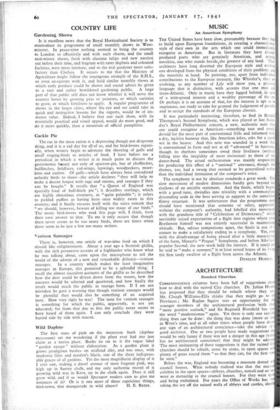MUSIC An American Symphony
THE United States have been slow, presumably because they had to build upon European foundations, in creating a characteristic style of their own in the arts which one could immediately recognise as American. But in literature they have already produced poets who are genuinely American, and among novelists, one who stands beside, the greatest of any land. The architects have long deserted the European style and evolved one developed from the physical conditions of their problems and the materials at hand. In painting, too, apart from individual contributions to the European treasury, like Whistler's, they are evolving, as any number of Life will show you, a pictorial language that is distinctive, with accents that one may call trans-Atlantic. Only in music have they lagged behind, in spite of a widespread interest and a wealthy patronage of the an. Or perhaps it is on account of that, for the interest is apt to be ingenuous, too ready to take for granted the judgement of pundits and to accept the standards of the European classics.
It was particularly interesting, therefore, to fmd in Randall Thompson's Second Symphony, which was played at last Satur. day's Royal Philharmonic concert, a new, authentic note that one could recognise as American—something taut and steely, devoid for the most part of conventional frills and informed with a dry, incisive humour that, like American jokes, asks for a quick wit in the hearer. And this note was sounded in a work that
is conventional in form and not at all " advanced " in harmony, though its rhythms sometimes owed their liveliness (without
falling into the insipidity of mere insistence) to those of the dance-band. The actual orchestration was mainly responsible for producing this effect of a " national " utterance, though the themes, too, had a twang that seemed to be generalised rather than the individual intonation of the composer's voice.
The symphony is not by absolute standards a great work. The slow movement of modest dimensions hardly gets beyond the shallows of an amiable sentiment. And the finale, which begins with a good tune, dwindles into triviality with a commonplace descending scale in the bass serving as support to the somewhat flimsy structure. It was unfortunate that the programme note should have mentioned that someone or other, apparently without the composer's authority, had labelled this movement with the grandiose title of " Celebration of Democracy," which inevitably raised expectations of a flight into regions where even Beethoven himself was not entirely successful in maintainin altitude. • But, odious comparisons apart, the finale is not of stature to make a satisfactory ending to a symphony. Yet, even with the disadvantage of being placed after a little masterpiece of the form, Mozart's " Prague " Symphony, and before Sibelius popular Second, the new work held the interest. If it could not be said to "make a summer," it at least raised hopes of its being the first tardy swallow of a flight from across the Atlantic.
DYNELEY HUSSEY.






























 Previous page
Previous page